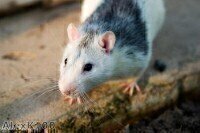-
 The effect of a tannin-rich diet has been studied by Portuguese scientists using quantitative analysis based on electrophoretic separation
The effect of a tannin-rich diet has been studied by Portuguese scientists using quantitative analysis based on electrophoretic separation
Electrophoretic separations
Quantitative analysis of mouse saliva indicates impact of tannins
Dec 17 2010
The study, carried out by scientists at the Universidade de Evora in Portugal and published in Proteome Science, relates the quantitative analysis of proteins expressed in mice with control and tannin-enriched diets.
According to the researchers, "this proteomic analysis provides evidence that other salivary polypeptides, in addition to tannin-precipitating proteins, are affected by tannin ingestion".
In all, 57 protein spots were selected from electrophoretic gels belonging to the control group for a total of 21 unique proteins identified.
A number of these were differently expressed in mice with tannin-enriched diets, while the results hinted proline-rich proteins may form soluble complexes in the presence of tannins.
Proteome Science says it will consider research in a number of fields, including mass spectrometry, protein arrays, structural biology and bioinformatics.
Events
Jan 20 2025 Amsterdam, Netherlands
Feb 03 2025 Dubai, UAE
Feb 05 2025 Guangzhou, China
Mar 01 2025 Boston, MA, USA
Mar 04 2025 Berlin, Germany











